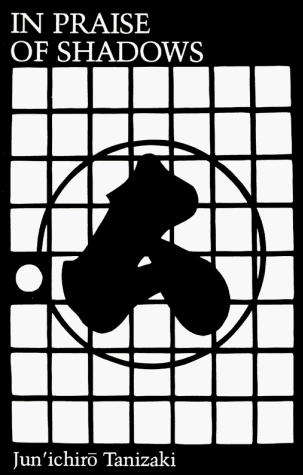| | 01/15/2013 |  Lately there has been a bunch blogged about the relevance of traditional crafts in this day and age. In thinking about crafts I realized that it's been awhile since I wrote about books that influenced me so here goes. Lately there has been a bunch blogged about the relevance of traditional crafts in this day and age. In thinking about crafts I realized that it's been awhile since I wrote about books that influenced me so here goes.
For me the most important thing I ever read about the importance of craft objects in our lives comes from reading Jun'ichiro Tanizaki's "In Praise of Shadows". It's a thin volume, only 73 pages long, and was first published in 1933 in Japan by Tanizaki who was a well known novelist at the time.
I first read the book in my 20's because someone thought that as I liked making things I might like the book and also because in my day carrying a short book by a Japanese author was always a good way to meet women (I don't remember that it worked - but since the book is so short I might not have been carrying it with me long enough).
In any case I thought the book interesting but very xenophobic. Which kind of makes sense because it was written in pre-war Japan when xenophobia was becoming the way of the land.
Several years ago I was talking with Toshio Odate and he recommended the book to me and I said I had read it and found it zenophobic and he said I should reread it because obviously I didn't understand it.
I reread it and he was right. I won't try to tell you what it's about but if you go to amazon.com and search they have the book with a "look inside"
In any case we don't sell it so this is not a specific plug - get it from the library instead.
In retrospect, thinking of the books I have read about craft, or really the decline of craft, I have to remember that every generation has complained that the arts and crafts of the previous generation were being lost. The nineteenth century had William Morris, Tanizaki is of course twentieth century, and modern bloggers and teachers such as Robin Wood, Doug Stowe, and Paul Sellers also bemoan the loss of craft.
The problem is that they are all right. Every generation has simplified production to use less labor and less craft. At the same time every generation has also found new craft in new inventions and technologies. How exciting it must have been in the eighteenth century to be able to buy tools made of consistent quality steel and use them to work all sorts of exciting materials imported from colonies all over the world. The challenge is the same today except what most people find exciting is the Internet and the silicon chip. What we lose in the process, and this is what I think Morris, Tanizaki, and their modern children rightly complain about, is the loss of an important psychological link to our past and a repression of a natural human instinct to use tools and to make physical things. We have become consumers. Each generation looks back at the previous generation and thinks that the previous generation had it harder (which they did) but somehow by making stuff themselves and by buying craft made stuff from people they knew and not from an anonymous factory, they had a better balance of new and old.
| Join the conversation | |
| The opinions expressed in this blog are those of the blog's author and guests and in no way reflect the views of Tools for Working Wood. |
|
 Joel's Blog
Joel's Blog Built-It Blog
Built-It Blog Video Roundup
Video Roundup Classes & Events
Classes & Events Work Magazine
Work Magazine


 Lately there has been a bunch blogged about the relevance of traditional crafts in this day and age. In thinking about crafts I realized that it's been awhile since I wrote about books that influenced me so here goes.
Lately there has been a bunch blogged about the relevance of traditional crafts in this day and age. In thinking about crafts I realized that it's been awhile since I wrote about books that influenced me so here goes.
In the meantime, it is becoming difficult to explain to those who have not been challenged to develop the simplest of skills, the ways developing those skills shapes one's whole relationship to life, appreciation for the past, human culture and the like. Certainly, technology has moved on from the hand saw and chisel and will keep doing so, but there is cause to keep these older technologies alive in our hands. There is value in learning to use tools that also give cause and pause for us to learn about ourselves.
You have good insight.
Thank you.
Our neighbor teaches at a Waldorf school, wonderful program.
Thanks for sharing this book, I'll search for a copy through our library.